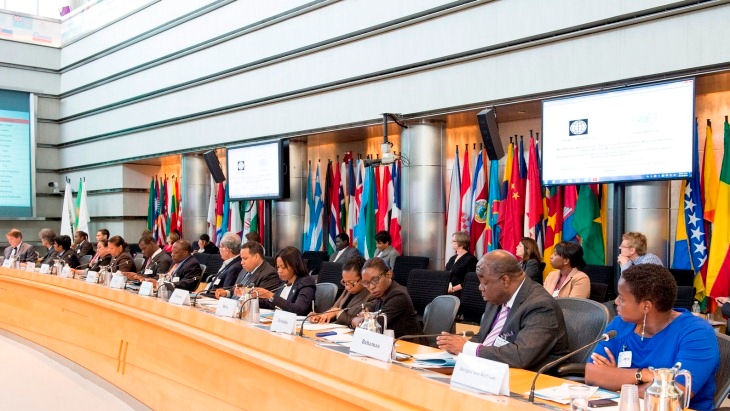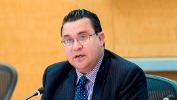Closing remarks by Pierre Laporte, Minister of Finance, Trade, and Investment, Seychelles and Chair of the Small States Forum
Distinguished Ambassadors, Executive Directors of the Bank, distinguished delegates, ladies and gentlemen, we come to the close of what has been, by all accounts, a very successful and productive high-level dialogue on advancing sustainable development in small island development states.
I must say that it has been enormously inspiring to me to see the representatives from over 20 countries meeting here to discuss, at times, I must say, passionately, common problems and challenges.
I want to express my sincere gratitude as Chair of the Small States Forum to the World Bank Group and the United Nations for hosting this important event today, which lays down a solid foundation for the Third International Conference on SIDS to be held in Samoa.
I would also like to graciously give special thanks to the Co-Chairs, speakers, facilitators, and all those who prepared papers and, of course, the distinguished Ambassadors, EDs of the World Bank Group, and distinguished delegates for your contributions which made this conference today a great success.
From my personal observations and notes, I feel we are all committed to return to our respective countries to achieve our ultimate dialogue objectives. It remains clearer than ever that SIDS face particular challenges which are common, regardless of whether one is establishing a national environment program or implementing a regional program on climate change.
Let me highlight some of the key conclusions that have come out of our very fruitful and rich discussions today.
In the morning session, we all agreed that a return to pre-crisis levels of economic growth calls for extraordinary efforts, individual and collectively.
We noted that investment on key drivers is essential for growth prospects. Private sector is key for breaking the vicious cycle of dependency.
In this context, business environment, investment climate are essential, but removing key bottlenecks and enhancing competitiveness in specific sectors are equally important.
We also need to make progress on reforms in macro fiscal management and governance. In this context, we benefitted from an extensive discussion on the structural interdependent causes of high debt, low growth, and natural disasters.
We recognized that debt sustainability can only be achieved if accompanied by sustainable growth and strengthening capacities to develop greater resilience and climate adaptation.
Nevertheless, we need to build up on institutions to address structural and continuous challenges of natural disasters.
SIDS continue to express the need for a review of the criteria for lending. In particular, we reiterate that per capita GDP on its own does not do justice to our specificities. We urge the Bank and other development partners to include vulnerability as a fundamental element in the lending criteria.
In the second morning session, we also discussed the importance of investing in human capital, and in this context we emphasized the need to address the challenge of health and NCD, in particular. This will ensure that development gains we achieved over the past decades are not substantially eroded.
We always need innovative ways to tap into remittances for productive investments. Remittances can be a stable source of finance, but financial costs, as we saw, are too high, and modalities, at times, too rudimentary.
A priority would be to benefit from IT and financial innovation.
In the afternoon sessions, we expressed concerns about the costs and impact of climate change and small states. We benefitted from an extensive discussion on the importance of climate change facilities. We emphasized the imperatives for small island states to build upon ongoing efforts with partners to promote the scaling up of renewable energy and efficiency measures.
Whilst we salute the increasing funding from the World Bank and some of the international NGOs, we remain concerned that most global climate change initiatives presently benefit mostly large economies. We want that to change.
We discussed the blue ocean economy and its critical importance for our development. We need to unlock the ocean's potential to increase economic growth and reduce poverty in a sustainable manner.
In managing our human resources, this is the only way forward, and the only way forward, we need to do so effectively but, most importantly, in a sustainable manner.
We wish to echo the comments made by Mr. Acharya, the UN Representative, that enough analysis has been done, and now, as Madam from Kiribati had already reiterated, it is time for action.
And we note, also, that the next 18 months will be a very critical period in terms of a partnership.
In conclusion, every day we strive to tackle new challenges and find solutions. No one has a more difficult situation than we do as SIDS, given our vulnerabilities.
The consequences of our actions will be felt by our succeeding generations. With the support of our development partners, the most we can do is think creatively and honestly and share the accumulation of our experience and knowledge with each other in a constructive way.
We share some examples of success in small states and underscore the need to continue to learn from each other, and also to tap into global expertise in specialized areas.
Let me concluded by stressing what I said in my opening remarks. If we are to succeed in our path toward sustainable development, small islands need more support. Neither a single country nor a single institution such as the World Bank can solve these priorities alone. Coordinated actions and effective partnerships are urgently needed. More concessional resources are needed. Organization and development partners must follow the example of the World Bank in terms of granting access to concessional finance.
More needs to be done in resilience building, including disaster preparedness and mitigation investments. Climate funds must squarely take into account the needs of small vulnerable states with limited capabilities.
Further actions are needed to obtain a fairer and more equitable return from our ocean resources. We must always remember that economic prosperity, sustainable development, trade opportunities, and environmental protection are inextricably linked and dependent on one another.
I would once again like to thank the Bank and the UN for organizing today's event.
Distinguished Ambassadors, EDs, delegates, ladies and gentlemen, we take this opportunity to join the Samoan Government in inviting you to Samoa in September.
I want to make a special mention to Mr. Gyan Acharya for having joined us today. I am pleased to note that he also will be joining us in Samoa.
With those, I want to thank you.

